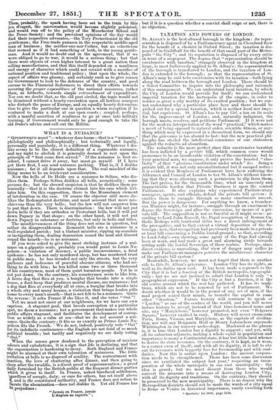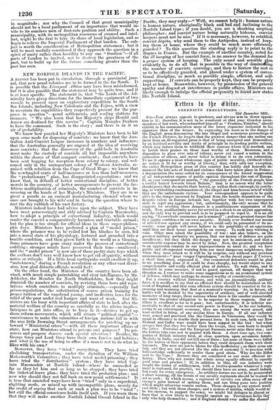TAXATION AND POWERS OF LONDON.
depose the Sovereign and alter the succession, by means of a pri- vate bill. The supposition is not so fanciful as it might seem : ac- cording to Lord John Russell, the Papal reco,gnition of Roman Ca- tholic Bishops with territorial titles was a direct infringement of the prerogative, and to that extent a virtual deposition of the So- vereign: now, that recognition had previously been made in a private or local bill concerning a Dublin burial-ground ; so that, according to Lord John's own showing, some agent of the Pope had alpeady been at work, and had made a great and alarming stride towards setting aside the lawful Sovereign of these realms. Perhaps, since direct evidence is unavailing, that view of danger may suffice to make our Parliament-managers perceive the mischievous character of the private bill system ?
Meanwhile, however, we must not forget that there is another side to this St. Alban's grievance. London City has its rights, as well as its duties upon coal. It has been made a reproach to the City that it is but a fraction of the British metropolis, topographi- cally : but we are not inclined to admit that London is only " a geographical expression." If the City is but a fraction, it is the old centre around which the rest has gathered. It has its tradi- tions, which are not to be renewed by act of Parliament. We doubt whether it would be in the power of any set of men, if the mad project seized their minds, to transfer the capital to some other " fraction." Future history, will continue to speak of " London " as one of the centres of the world, and you will never induce history to accept, instead of that time-honoured name and site, any " Marylebone," however promoted, nor even " Belgrave Square," however exalted in rank. History will never enumerate Paris, Rome, Vienna, and Marylebone, as the capitals of civiliza- tion, nor will any Benjamin Hall or Henry Labouchere supersede Whittington in our nursery archaeology. Hacknied as the phrase is, it is true that London has a dignity to support ; and yet, with all its suburban adjuncts, making a whole equal in population and importance to many a Continental state, it has but little land whence When the senses grow deadened to the perception of noxious
Lion needs to be respecting an ineor, y furnished by the British public at the frequent dinner-parties strengthened. There has been some discussion * since we ventilated the subject last year, poration of the whole metropolis in one vast municipality : the hich it gives to itself. In France, naked barefaced selfishness, idea is grand; but we must dissent from those who would, convert the measure into a means of destroying London City, with all its dignity and traditions. On the contrary, they should be preserved to the new municipality. There is no reason why the Metropolitan districts should not be made the wards of a city equal to Rome or Venice in historical importance, vastly excelling both
• Spectator for 1850, page 1139. lemioally—that it is the doctrine chimed into his ears which irri- impracticable burden that Private Business is upon the central tate. s him. On this supposition, there is the Mussulman element Parliament. It also explains why experienced Parliamentary of intoleration in the case. Of course the objector still more dis- managers, agents, and officials, defend the private bill system : it likes the Redemptorist doctrine, and must account that more mis- , enables them to smuggle through so many enactments unseen. ehievous than the very bells; but the law will not empower him But the power is dangerous. For anything we know, a treacher- to put that down. There is discrimination : the law will not put down bells if they are orthodox or Protestant bells, but it will put down Papacy in that shape ; on the other hand, it will not put down Papacy in substance or doctrine, but only in bells and titles.
ous Minister might, for instance, smuggle through an enactment to
Sr. ALBAN'S is the best-abused borough in the kingdom : its repre- sentation is disposed of by a Parliamentary agent in Cleveland Row for the benefit of a chemist in Oxford Street; its taxation is dis- posed of in Guildhall for the benefit of that small part of the Metro- polis " the City "; and its reputation is disposed of by every critic in want of a scapegoat. The dogma that " representation should be coextensive with taxation," strangely observed in the kingdom at large, is most ludicrously applied to St. Alban's : the representation of the borough is transferred to London, and the taxation of Lon- don is extended to the borough ; so that the representation of St. Alban's may be said tobe coextensive with its taxation—both lying along the road between the borough and London. There should be a Select Committee to inquire into the philosophy and rationale of this arrangement. We can understand local taxation, by which the City of London would provide for itself; we can understand imperial taxation for the metropolis of the empire, in order to render so great a city worthy of its exalted position ; but we can- not understand why a particular place here and there should be picked out for a special taxation, which is neither local nor impe- rial, but capricious. St. Alban's has to pay I3d. a ton on its coals for the improvement of London ; and, naturally indignant, the borough meets, resolves, and petitions Parliament. If it were not for the modern interpretation of the word "practical," which makes a merit of being opposed to natural order, scientific fitness, or any- thing which may be expressed in a theoretical form, we should say that the grievance is too absurd to last: but the new practical phi- losophy has steeled the intellectual conscience of our statesmen against the reductio ad absurdum.
The reductio is the more perfect since this coextensive taxation has been inflicted by a private bill, which common sense would pronounce to be an insufferable violation of the constitution: but to your practical man, we suppose, it only proves the boasted " elas- ticity " of that " glorious constitution under which " &c. Being a private bill, it was not only unconstitutional but it escaped notice : it is evident that Members of Parliament have been suffering the Aldermen and Council of London to tax St. Alban's without know- ing that they were allowing such a permission to slip from them.. The fact proves, for the thousandth time, what an unseemly and
in magnitude ; nor why the Council of that great municipality should not be a local parliament of an importance that would in- vite to its conclave men of first-rate position and ability. Such a municipality, with its metropolitan resources of counsel and intel- lect, might be the first to take its share of local legislation, and so begin to relieve the Imperial Parliament of that burden. The sub- ject is worth the consideration of Metropolitan statesmen; but, it will be most usefully considered if they approach the question in a spirit of amity rather than hostility to any one " fraction "—if all parts of London be invited, not to destroy the greatness of the past, but to build up for the future something greater than the past has seen.



























 Previous page
Previous page